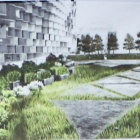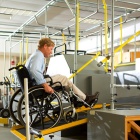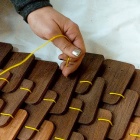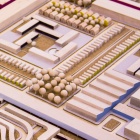MArch: 2-Yr. Synthesis and Integrated Studio Track Curriculum
This track is for students who have successfully completed a studio-based, four or five year undergraduate program in architecture from a regionally accredited four-year US college or university or an equivalent credential from a qualifying international institution which includes at least 5 studios, plus at least 44 equivalent credits in architectural history, technology and media.
Students applying into the 2-Yr. Synthesis and Intergrated Studio Track are only eligible to apply for fall term start.
The curriculum of any vital and dynamic program will change from time to time. The description, which follows, should be considered illustrative.
All enrolled graduate students should have in their possession an original copy of the curriculum they must satisfy based upon their date of matriculation. Matrixes are sent to all students when they accept into the program. If you need a copy of your matrix, please contact the Graduate Program Coordinator, Stacey Komendat.
- Students may apply to waive a required course based on prior coursework. Incoming students in the M.Arch (synthesis and integrated studio track will be sent instructions on how to request a course waiver through their portal. Please see the course waiver page for additional information.
2-Year Master of Architecture (MArch) Synthesis and Integrated Studio Track Curriculum- FALL 2024
Curriculum Effective Fall 2024
| Semester 1: Fall | ||
| ARC 603 | Design Studio 3 | 6 |
| ARC 553 | Structures 2 | 3 |
| ARC 511 | Architectural Media 1 | 3 |
| ARC 573 | Environmental Systems 2 | 3 |
| Total Semester Credits | 15 | |
| Semester 2: Spring | ||
| ARC 604 | Design Studio 4 | 6 |
| ARC 582 | Professional Practice | 3 |
| ARC 575 | Environmental Systems 3 | 3 |
| ARC 512 | Architectural Media 2 | 3 |
| Total Semester Credits | 15 | |
| Semester 3: Fall | ||
| ARC 605/7 or ARC 567 | Research Studio or Directed Research | 6 |
| ARC 562 | Architectural Theory | 3 |
| ARC 611 | Architectural Media 3 | 3 |
| ARC 555 | Structures 3 | 3 |
| Total Semester Credits | 15 | |
| Semester 4: Spring | ||
| ARC 606/8 | Research Studio or Thesis | 6 |
| ARC XXX | Intellectual Domain or Technical Methods Seminar | 3 |
| ARC 697 or ARC XXX | Portfolio (required if not doing Thesis) or Elective | 3 |
| ARC XXX | Elective | 3 |
| Total Semester Credits | 15 | |
| Total Required Credits | 60 |
Please see the Registration and Enrollment Page as it answers many questions about our programs and registration policies.
Notes:
Students who have an admissions letter indicating that they need to take ARC 534 (Architectural History 2) should plan to take this course in substitute for their final elective in the program (semester 4).
Course Waivers:
It is recommended that incoming students in this track request course waivers through their portal before beginning the program. Student who receive a waiver for Structures 2 may be able to take Structures 3 in the fall semester. Students who receive a waiver for Environmental Systems 2 or Architectural Communications 1 will replace the courses with an elective, and intellectual domain course or a technical methods course in the fall semester. All students are encouraged to submit a waiver for ARC 542 (Construction Technology). Receiving waivers for courses does not decrease the total number of credits required in the program. More information on waivers is available on the waivers page.
Students who plan to do Thesis must be registered for Directed Research the semester before Thesis. A minimum GPA of 3.5 is required for those who wish to be registered for Directed Research or Thesis. More information can be found on the Directed Research and Thesis information page.
Students are required to take either Thesis or Portfolio to fulfill their culminating experience for graduation.
Students may register for a maximum of one independent study course each semester, with a maximum career total of two. Independent study courses will count toward elective credits.
Technical Methods and Intellectual domain course numbers are listed below. Descriptions of these courses can be found on the Information for Current Students page.
Technical Methods Seminars:
Fall Semester
ARC 543 Technical Method- Material Culture
ARC 545 Technical Method- Ecological Practices
ARC 547 Technical Method- Urban Design
ARC 617 Technical Method- Situated Technology
ARC 620 Technical Method- Inclusive Design
Spring Semester
ARC 544 Technical Method- Material Culture
ARC 546 Technical Method- Ecological Practices
ARC 551 Technical Method- Urban Design
ARC 619 Technical Method- Situated Technology
ARC 621 Technical Method- Inclusive Design
Intellectual Domain Seminars:
Fall Semester
ARC 623 Intellectual Domain- Inclusive Design
ARC 625 Intellectual Domain- Situated Technology
ARC 627 Intellectual Domain- Ecological Practices
ARC 629 Intellectual Domain- Urban Design
ARC 632 Intellectual Domain- Material Culture
Spring Semester
ARC 624 Intellectual Domain- Inclusive Design
ARC 626 Intellectual Domain- Situated Technology
ARC 628 Intellectual Domain- Ecological Practices
ARC 630 Intellectual Domain- Urban Design
ARC 633 Intellectual Domain- Material Culture
Explore our Graduate Research Groups
In addition to completing required core courses, students take seminars and studios in the Graduate Research Groups. Through this unique program, students gain both core competencies in architectural design and specialized knowledge and skills that align with their interests and career ambitions.
Courses
Develop versatile skills with our courses: focused, practical, and relevant





